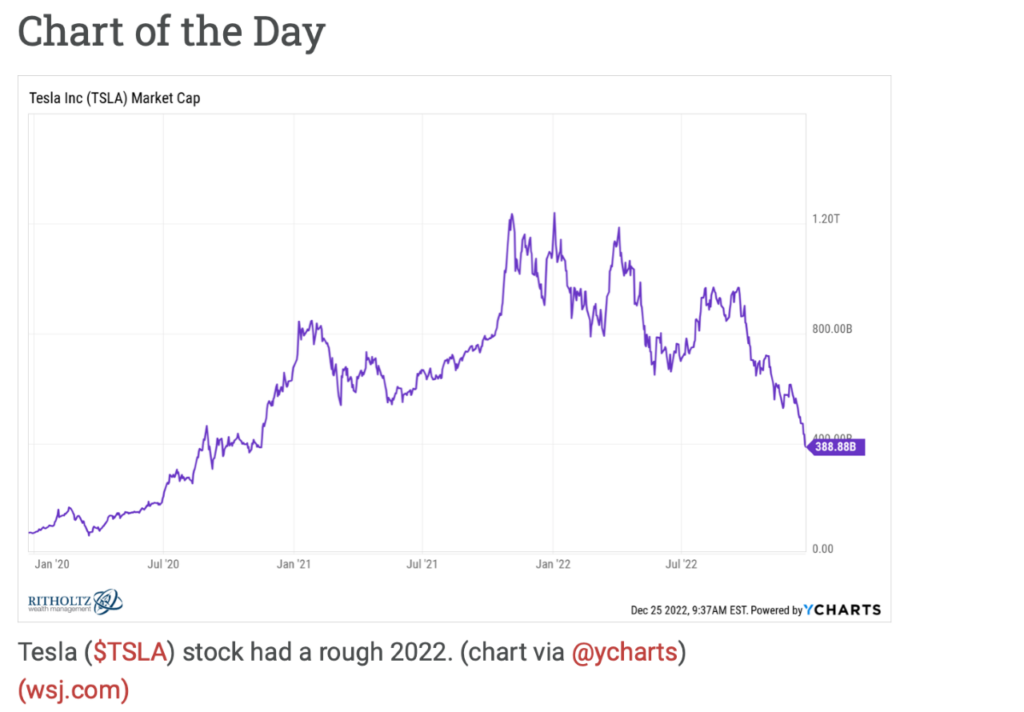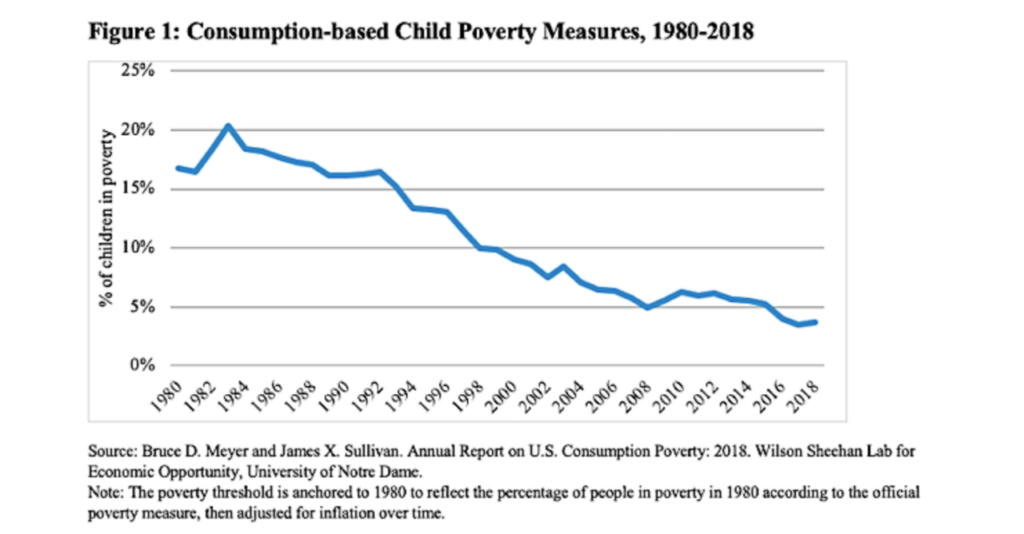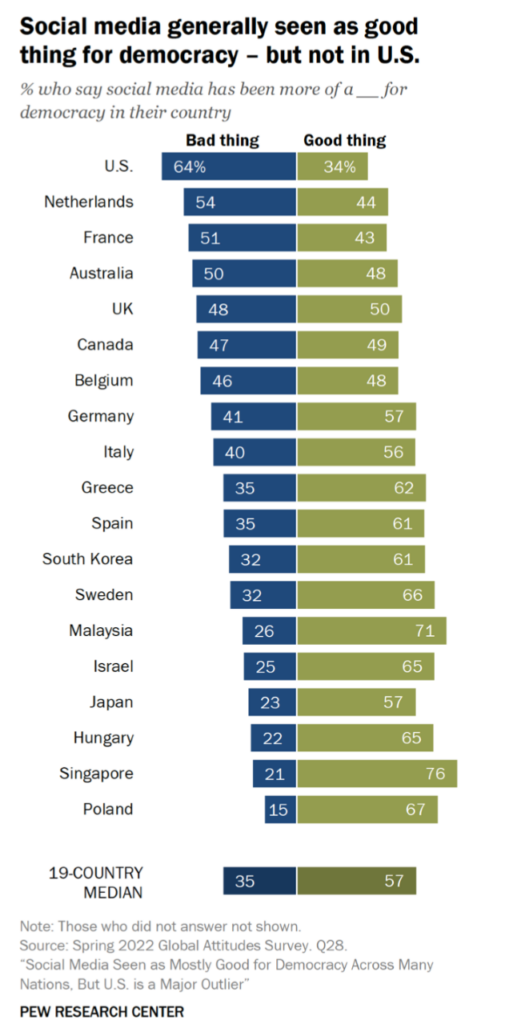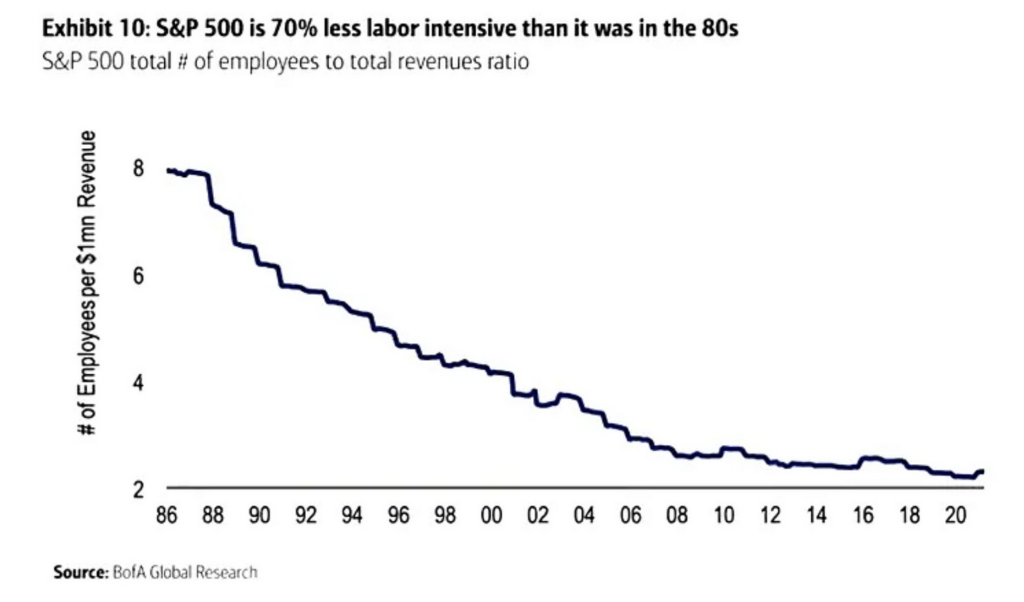1. How Did 2022’s Most Loved Stocks by Analysts Fare?
Bespoke Investment Group As we approach year end, today we looked at where analyst ratings stood for Russell 1,000 stocks at the end of 2021 to see how the most loved stocks at the start of the year ended up performing. Looking at just stocks with coverage from at least eight analysts, the average Russell 1,000 stock had about 59% buy ratings at the start of 2022.
Sixty-three Russell 1,000 stocks began the year with at least 90% buy ratings, while 52 stocks had less than 20% buy ratings. Those 52 stocks with less than 20% buy ratings are currently down an average of 10.7% YTD on a total return basis. The 63 stocks with 90%+ buy ratings are down an average of 22.8%.
The 38 stocks below had at least 92% buy ratings at the start of 2022. Of these 38, the 24 with 100% buy ratings are down an average of 32% YTD. The biggest of the “100% buy” stocks is Amazon (AMZN). At the start of 2022, all 59 analysts covering the name had a buy rating. It’s down just under 50% YTD as of this morning. Two of the 24 stocks with all buy ratings on 12/31/21 posted gains this year: Encompass Health (EHC) and Horizon Therapeutics (HZNP). That’s a “batting average” of under .100 with roughly 28% of Russell 1,000 stocks in the green on the year. Click here to learn more about Bespoke’s premium stock market research service.

As always, past performance is no guarantee of future results.
2. Euro Natural Gas Prices Continue to Fall Even as Cold Front Hits
The Daily Shot Blog

3. China FXI Large Cap ETF …Covid Lockdown Over
FXI…Right on 200 day ….50 day turning upwards

4. Tesla Market Cap….$1.2 Trillion to $388B
From Abnormal Returns Blog www.abnormalreturns.com

5. Silvergate-The Crypto Bank Roundtrip to Covid Levels

6. The Number of U.S. Children Below the Poverty Line -59% Since 1993
NYT Deal Book Real progress is being made in tackling child poverty. The number of children in America living below the poverty line has plummeted by 59 percent since 1993. As The Times’s Jason DeParle reported in September, “child poverty has fallen in every state, and it has fallen by about the same degree among children who are white, Black, Hispanic and Asian, living with one parent or two, and in native or immigrant households.” The improvements coincide with more generous state and federal subsidies for working families, and changes to welfare laws that make it easier for struggling households to apply for assistance programs.
https://www.nytimes.com/2022/12/24/business/dealbook/optimisim-in-2023.html

7. Majority of Americans Think Social Media Bad for Democracy
Pew Research

https://www.pewresearch.org/fact-tank/2022/12/13/striking-findings-from-2022/
8. A nutritionist shares the best snacks to bring on a plane to boost your immune system-CNBC
Monica Pitrelli@MONICAPITRELLI
Travelers have a host of pathogens to dodge this winter, including the “tripledemic” of infections caused by Covid-19, flu and RSV (respiratory syncytial virus).
But there are steps people can take to reduce their chances of getting sick, say health specialists at Spain’s SHA Wellness Clinic.
The key is to develop “a resilient immune system that can defend itself from attack by viruses and bacteria,” said Dr. Vicente Mera, SHA’s head of genomic medicine.
What to eat
“The most important thing is nutrition,” Mera said.
But drastic dieting isn’t necessary, he added.Rather, travelers can simply eat whole, plant-based foods, which can help decrease inflammation, he said.
Fiber in plant-based foods also helps the gut microbiome “fight pathogens that enter or are activated through the digestive tract,” he said.
Eating a nutrient-dense diet is the top recommendation from Melanie Waxman, an integrative nutrition specialist and eating coach at SHA Wellness Clinic.
That means eating “lots of vegetables, whole grains, fresh herbs, beans, sea vegetables, fruits, nuts, seeds and fermented foods,” she said.
What to pack on a plane
Waxman said travelers should snack on alkaline foods to combat acidity that is commonly caused by air travel. She recommended these easy-to-pack foods:
- Toasted nori snacks: ”Great for travelling as they are light and easy to carry in small packs. Nori is alkaline and provides a good source of vitamin C, as well as omega-3 fatty acids, protein and minerals.”
- Instant miso soup: “Contains all the essential amino acids … and restores beneficial probiotics to the intestines … great for flights and in hotel rooms as you only need to add boiling water to the sachet.”
- Spirulina powder:“Packed with calcium and protein. It has a high chlorophyll content … is especially beneficial after spending hours in airplane cabins. The flavor can be strong so add it to a refreshing vegetable juice … [or take] as a capsule.”
- Plum balls:“A wonderful travel companion, as they are extremely alkaline, full of minerals that help increase energy, aid digestion, boost immunity and improve liver functions … the balls come in a container and are easy to pack in a cabin bag.”
Breakfast
Waxman recommends drinking one tablespoon of apple cider vinegar mixed with a glass of water before breakfast. The vinegar is “a powerful immune booster … full of probiotics,” she said.
For breakfast, a “wonderful” choice is oatmealtopped with berries, chia seeds and flax seeds, she said.
“Oats actually help the body produce melatonin more naturally,” she said. “Oats contain amino acids, potassium, B vitamins, magnesium and complex carbs … berries pack a punch of vitamin C, and the seeds provide extra omega-3 and protein.”
Jet lag
To combat jet lag, Waxman recommends taking more vitamin C.
She recommends eating sauerkraut, both before and after flying. “Fermenting cabbage causes the vitamin C and antioxidant levels to skyrocket,” she said.
Fresh vegetable juice is also great for immunity and jet lag recovery, she said.
Getting enough sleep
Sleep and immunity are closely linked, Mera said.
“Restful sleep strengthens nature immunity,” he said, adding that poor quality, or quantity, of sleep increases the chances of falling sick.
People who average less than six hours of sleep a night, or 40 hours per week, have “a serious risk of illness,” he said.
Exercise — but don’t overdo it
Moderate exercise strengthens the immune system, Mera said.
But “30 minutes a day is more than enough,” he said. “Prolonged intense exercise can suppress the immune system.”
Examples of beneficial exercise include running, walking, swimming and cycling, he said.
Supplements, for some
Studies indicate that certain supplements — such as vitamin C, vitamin D, zinc, garlic, echinacea and green tea — may strengthen the body’s immune response, Mera said.
But, he said, they’re not necessary for everyone.
“It only compensates for nutrient deficiencies, which usually occur when nutrition is inadequate, or the immune system is very depressed,” he said.
Other recommendations
To strengthen the immune system, Waxman also suggests Epsom salt baths (“magnesium is easily absorbed through the skin”), using essential oils (“especially lavender, eucalyptus or tree tree oil”), drinking plenty of water and cutting back on alcohol, caffeine and sugar.
Mera added that relieving stress and anxiety is critical to immune health. He recommends meditation, yoga, tai chi and mindfulness to better manage emotions.
Philippa Harvey, head of SHA’s traditional Chinese medicine department, said travelers should start taking steps to strengthen their immune systems about a week before traveling.
“In TCM when someone is healthy and happy we say they have good qi, pronounced ‘chee’” she said.
She recommends eating foods that are in season, especially garlic and ginger in the autumn and winter.
She also recommends exercise and acupressure to stay healthy.
“Before we travel, a nice brisk walk in fresh air is the simplest solution,” she said.
9. Labor Intensity of S&P 500 Down -70% Since 1980
CallumThoma Chart Storm S&P500 Labor Intensity: “In 1986, it took 8 employees to generate US$1 million in revenue. Today, the S&P 500 is 70% less labor intensive than it was in the 80s”

Source: @ISABELNET_SA (ChartStorm 20 June 2021)
https://chartstorm.substack.com/p/weekly-s-and-p500-chartstorm-24-december
10. 5 Things to Make You Smarter -Eric Barker
We can’t improve our genetics but a lot of our mediocrity is self-imposed. There are a number of prescription-strength things we can do to make sure we’re firing on all cylinders and making the best of what we have. We can’t do much to become dramatically smarter but we can do a lot to be less dumb.
Alright, it’s time to lift the zoning restrictions on your brain. Let’s get to it…
Get Your Sleep
I know, I know – that sounds obvious. But as Christopher Hitchens wrote, “Ah, please never forget how useful the obvious can be.” Because as obvious as it may sound, we just don’t do it. UC Berkeley sleep researcher Matthew Walker reports, “Two-thirds of adults throughout all developed nations fail to obtain the recommended eight hours of nightly sleep.”
Getting enough sleep is a cognitive cheat code. Meanwhile, sleep deprivation knocks the intellectual right out of you. Educational studies show missing an hour of sleep turns a sixth grader’s brain into that of a fourth grader. There’s actually a clear correlation between sleep and grades: “Teens who received A’s averaged about fifteen more minutes sleep than the B students, who in turn averaged fifteen more minutes than the C’s, and so on.”
And the old maxim “sleep on it” is true. You do make better decisions after a good night’s rest.
Well, I don’t get enough sleep, but I feel fine…
That is the slumber equivalent of a drunk saying, ‘Gimme the keys. I’m okay to drive.” In studies, sleep-deprived people consistently underestimate how impaired they are: “after just a few days, the four- and six-hour group reported that, yes, they were slightly sleepy. But they insisted they had adjusted to their new state. Even 14 days into the study, they said sleepiness was not affecting them. In fact, their performance had tanked.”
But isn’t there an easy magic pill?
Well, kinda: coffee and cigarettes. Caffeine and nicotine both boost brainpower, temporarily. (This must be how Cinderella felt.) But they’re a double-edged sword. Cigarettes, obviously, are mucho bad for your health. And while moderate amounts of caffeine are healthy, it can seriously monkey with your ability to sleep. (I am not a caffeine addict. I prefer the word “enthusiast.”) We think that college students who like to party get worse grades because of drinking, but studies show the majority of negative impact comes from daytime drowsiness due to caffeine and poor sleep.
So what else can we do to be less dumb?
Get Your Exercise
Believe it or not, your brain is part of your body. And what’s good for your body is good for your brain. Here’s a sentence for you: “Scientifically, on the current evidence, exercise is the best way to enhance your cognitive function.”
When you exercise it boosts BDNF (brain-derived neurotrophic factor) which helps you learn faster. How much faster? As much as 20%. In fact, cognitive control is measurably better after just a single exercise session.
And if you want to hold on to those precious IQ points as you age, there’s this: “An analysis of sixteen prospective studies including more than 160,000 individuals found that moderate levels of physical activity lowered the risk of Alzheimer’s by 45 percent.”
“Dumb jocks” aren’t looking so dumb anymore. So taking care of your body with sleep and exercise is important, but we can also stay smart by improving what we do with that gray matter…
Stay Calm
Your car can have the most powerful engine in the world, but if someone else grabs the wheel, you’re not going to get where you wanna go. Impulsive feelings can lasso you and hogtie your judgment. Even if you have a high IQ, if you’re caught in a Pigpen cloud of emotion, you’re going to make bad decisions. It’ll be puberty redux.
Staying calm is the séance that precedes the exorcism. Scientists refer to it as “arousal control.” How do we stay chill? When you start to get stressed, relax yourself with deep breaths. Teaching recruits to monitor their breathing helped increase Navy SEAL passing rates from 25 to 33 percent. They didn’t freak out, screw up or quit.
Whenever you know you have something challenging coming up, take the time to prepare. A feeling of control reduces stress and keeps our thinking clear. Sounds simple but it’s powerful. When I interviewed someone who defuses bombs for a living, what did he say was vital for staying calm and making the right decision? Always knowing what you need to do next and focusing on that.
Like I said, IQ isn’t everything. It’s great for simple straightforward decisions, but with complex decisions rational IQ-style thinking can backfire. With complex decisions the research shows going with your gut can often be the better choice. And if you’re an expert at something, definitely go with your gut.
Emotions can be useful. To make smart decisions we need to listen to them – but not be controlled by them.
Still with me or are you checking text messages? That raises another issue…
Focus
The internet is half enlightenment engine, half dehydrated concentrate of stupidity. Spend too much time on social media (the epicenter of modern tantrum culture) and you will end up theatrically troubled. It feels like your brain is having trash shoveled into it. What else has such a capacity to make us both simultaneously exhausted and overstimulated?
Neuroscience conclusively shows your brain can’t multitask. Yes, you may think you’re good at it but just like sleep, this is an area where you shouldn’t trust your perceptions. Shifting between tasks is not seamless for your brain. Your focus and attention take a hit every time you switch. Constantly bouncing around between tasks produces the equivalent of a 10-point IQ drop.
Meanwhile, what does research show the most productive computer programmers have in common? An environment free from distraction. So when you want to be at your best, silence your phone and distance yourself from all those attention burglars. “Batch” all email checking, texting, and social media into pre-designated times. Then turn off notifications. This allows your brain to hum at full capacity and increases the secretion of elbow grease to get good work done.
But what’s the most powerful and easiest way to get smarter? Well, it’s not even about you…
Ask For That Thing Called “Help”
Handling every challenge in life by yourself builds character (mostly through nightmares). Your education isn’t complete until you’ve learned to take a hint. When you’re unsure, get help.
You’re not in middle school anymore where getting someone else’s answers is called cheating. You can’t learn the smartest way to handle everything on your own. Ask for advice.
People are busy. They don’t wanna help me.
Wrong-amundo. The research says: “people underestimated by as much as 50% the likelihood that others would agree to a direct request for help…”
Fine, but they’ll be irritated and think I’m stupid.
No, that perspective is stupid. Wharton professor Adam Grant finds: “research shows that people who regularly seek advice and help from knowledgeable colleagues are actually rated more favorably by supervisors than those who never seek advice and help.”
Know what’s even better than just occasionally asking for help? Find a mentor. But does needing someone to guide you mean you’re not a genius? Quite likely the opposite…
For his book Creativity, Mihaly Csikszentmihalyi interviewed over 91 of the most brilliant people in the world (including 14 Nobel prize winners). What did they have in common? By the time they were college age, almost every one of those earthshakers had an important mentor.” (To learn the best way to select and get a mentor click here.)
Okay, time to round it all up and learn the good news about the bad news regarding what happens to your smarts as you age…
Sum Up-Here’s how to get smarter:
- Get Your Sleep: As a hard-working blogger and author, I assure you that the fact I sometimes get only 5-6 hours of sleep a night is the fine good for think when importantly function productive.
- Get Your Exercise: What helps your body helps your brain. (If you’re the one person reading this who has friends insisting “You really need to exercise less to improve your health!” then feel free to ignore this.)
- Stay Calm: We’re grown-ups – but often only theoretically. Impulsivity is considered a negative in research studies and on witness stands. Increase calm to increase smart judgment.
- Focus: Things are rarely so bad that distractions can’t make them worse. You do not need the latest cultural software update from social media. I know singletasking sounds like something only elderly people do, like pinochle or saving money, but give it a try.
- Get Help: Pre-masticated knowledge is often the best kind. That’s why you’re reading this. Ask for advice. Become the chimeric blend of the smartest people around you.
Do we become less intelligent as we age? The scientific answer is: yes and no.
The research shows there are two kinds of intelligence: fluid and crystallized. Fluid intelligence is raw processing power. Figuring things out with no knowledge. Crystallized intelligence is closer to expertise, based more on prior learning and information.
Fluid intelligence declines rapidly as we get older. In fact, it begins dropping at around age 25. Yeesh. But crystallized intelligence doesn’t even peak until age 60. It’s well known that top mathematicians and physicists do their best work in the first half of life. Meanwhile, great authors usually create their masterworks in the second half. (Fingers crossed.)
So as you age, focus on building skills and knowledge. Your processor may not be as fast but you can make up for it with a bigger hard drive. Become an expert at something deep and rich that you’re passionate about — and keep learning. You may not be as sharp as the young whippersnappers but if you focus on gaining more information about your field they won’t be able to keep up with you.
IQ isn’t everything. It’s just a measure of potential. It’s what you do with what you have that really matters. And, as P.J. O’ Rourke noted, maybe it’s a good thing we’re not John von Neumann:
“Smart people don’t start many bar fights. But stupid people don’t build many hydrogen bombs.”